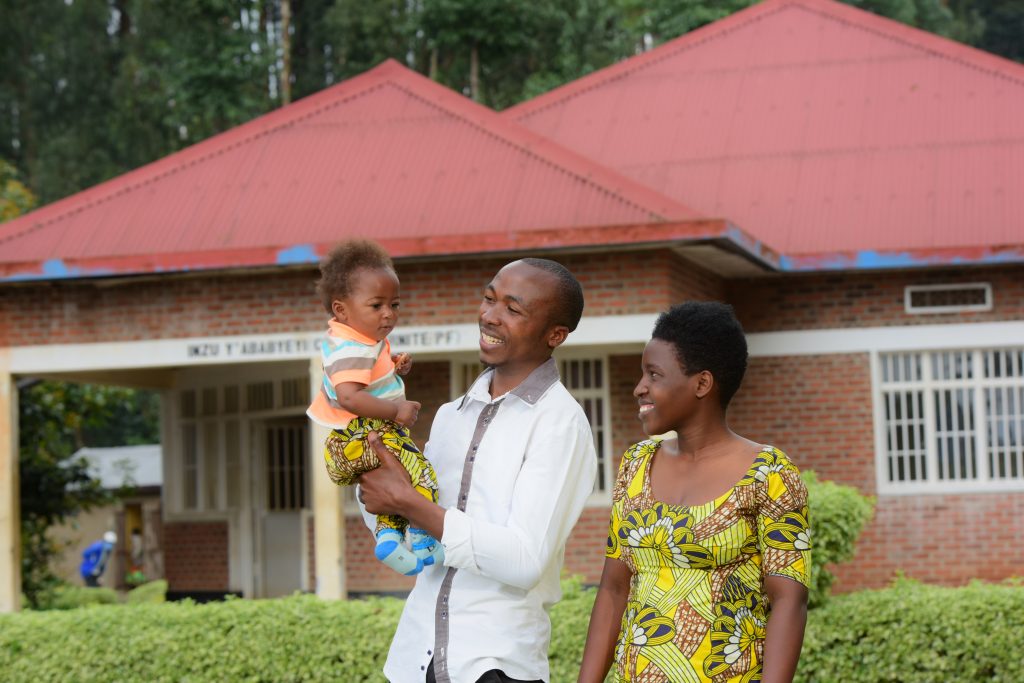
Written by: Kate Doyle, Equimundo Fellow and Emmanuel Karamage, RWAMREC
In Rwanda, efforts have been ongoing to take the gender transformative Bandebereho intervention to scale through the health sector, with the long-term aim of making the intervention available to all families nationwide. Bandebereho, adapted from Program P, engages men in promoting maternal, newborn and child health, violence prevention, caregiving, and healthier couple relations. Expectant and current fathers of young children are invited to attend weekly, small group sessions of critical reflection, discussion, and participatory activities with other men and couples in their communities. It was first adapted to the Rwandan context in 2013 by the Rwanda Men’s Resource Center (RWAMREC) and Equimundo. In its initial pilot, forty-eight trained fathers facilitated the group sessions – reaching more than 3,000 men and women in their communities in less than two years.
A randomized controlled trial demonstrated that the group sessions had a significant impact on multiple health and gender-related outcomes, including: men’s use of violence against their partners, both parents’ use of violence against their children, women’s antenatal care attendance and men’s accompaniment, couples’ use of family planning, and men’s participation and time spent on both childcare and household tasks. Importantly, the intervention also led to improvements in couple communication and women’s participation in household decision-making.
Following Bandebereho’s initial success, RWAMREC, Equimundo, and the Rwanda Biomedical Center – through the department of Maternal, Child and Community Health – embarked on a journey to expand the reach, availability, and cost-effectiveness of the intervention by embedding it within the health sector. Since 2019, they have collaborated to train community health workers – who form a critical part of Rwanda’s health system and are present in every village – to test the delivery of the transformative group sessions with couples as part of their routine work in one district. With support from the UK’s WOW (Work and Opportunities for Women) Fund, Saving Brains, and Wellspring Philanthropic, 432 community health workers have reached nearly 10,000 men and women since early 2020, despite the immense challenges and interruptions presented by the COVID-19 pandemic.
The shift from an NGO-led model to one that is embedded within the health system is a process that has been made possible by strong collaboration with several government institutions – led by RBC and the Ministry of Health, and including district government and health officials, the Ministry of Gender and Family Promotion, and the National Early Childhood Development Agency. After a little more than two years of implementation, monitoring and evaluation, the partners are now looking to the future and planning for how to implement Bandebereho in all 30 districts of the country.
In late May, the Rwanda Biomedical Center and RWAMREC convened a three-day strategy session to shape a national strategy for taking Bandebereho to scale through the health sector nationwide. Twenty representatives and technical experts from RBC, Ministry of Health, Ministry of Gender and Family Promotion, National Early Childhood Development Agency, Musanze district government, health facilities, RWAMREC, and Equimundo came together to look back on the progress and lessons learned and agree on the most effective and sustainable way for rolling out Bandebereho in more districts. The meeting demonstrated the importance and power of multi-sectoral collaboration, co-creation, and government ownership. The group testified to the impact of Bandebereho on local communities, particularly during the pandemic, and recommitted to institutionalizing the approach within the health sector. Over the coming months, the strategy will be finalized and submitted for government approval, marking an important turning point for engaging men and couples across Rwanda in challenging the inequitable gender norms that undermine the health and wellbeing of their families.